We know that pest issues “bug” most residents. However, depending on how you try to resolve the issue, you may unknowingly cause harm to our local creeks and rivers.
The City of Lincoln now has an Our Water Our World IPM and pest control expert to help Lincoln residents and businesses resolve their pest problems in an environmentally-friendly way. Submit questions below, and our expert experienced in the development and communication of least-toxic, sustainable, and environmentally sound Integrated Pest Management (IPM) solutions will guide you in the right direction!
Looking for pest-specific advice? Ask Lincoln’s IPM expert!
Ask The Expert Pest Control Topics of Concern
A summary of the questions received to date have been summarized and posted below.
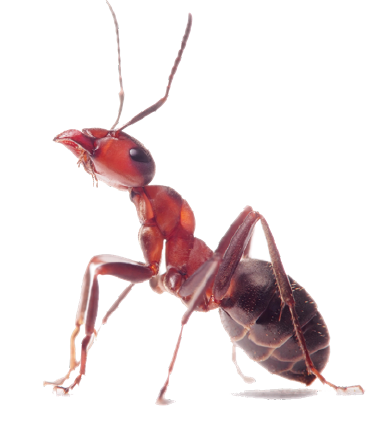 1. What is the best way to handle ants inside my house?
1. What is the best way to handle ants inside my house?
We recommend that you take the following approach:
- Use strategically placed ant bait stations;
- Use a wet, soapy cloth to clean up ants and their scent trail; and
- Patrol the outside of the home for entrances the ants using.
There are many effective bait products out there. Here’s a link to an example product that works well. For efficiency and safety for you, your pets, and the environment, follow the instructions closely. The ants take bait back to the colony. Sprays are not recommended. Sprays only kill the few ants you can see and leave pesticide in your home. Sprays are also not effective against ants outside of the house.
Further, those sprays have a pesticide that can be very harmful to you and the water supply. Use a wet, soapy cloth when you wipe up ant trails. The soap erases the scent the ants left behind for others to follow. Also critical is using a caulk gun and patching any entrances the ants are using. This link is to the University of California page on how to exclude ants from the home.
2. What is the best way to handle ants outdoors?
Ants outside the home are not too serious, but they can definitely be a nuisance. Using ant bait stations is the key. Generally, the bait stations come several to a pack, and the directions will tell you where to best place them for the best results. With bait stations, an ant or two will take some home to the colony, then you are handling the whole colony.
Sprays only kill the few ants you see, can unintentionally cause harm to other insects we do need, and can possibly be harmful to us and our pets.
3. How can I handle ants in my lawn and patio area without harming my pets?
A possible reason the ants might be at the lawn line is that the soil is very wet from all the rain we just had, causing the ants to try to leave. Looking at the active ingredients in outside ant bait stations or sprays, it doesn’t look like they are safe for your pets. The stations are meant to be hidden, but the risk that your pets would find it is not a good risk to take. The sprays have a strong insecticide that would also be a high risk.
Unfortunately, organic options, such as herb oils and diatomaceous earth, may not be a good option either. Organics rely on oils that burn or on bits of dust with silica that could irritate your pets’ noses or lungs. To be sure the ants don’t get inside the house, there is excellent information on how to exclude ants here. Hopefully, knowing that the species of ant you have outside aren’t likely to be survivors in the house, and that the rain we recently had could be making the ants run around, you will feel comfortable about not treating the ants.
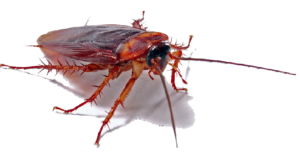 How can I get rid of cockroaches in my garage?
How can I get rid of cockroaches in my garage?
Cockroaches thrive where there is food, water, and protection. Garages often have all that and are difficult to seal off because of garage doors. Using a combination of control measures and bait stations (not sprays) will give the best long-term result. Certain bait stations work best and have the least danger to you, pets, and the environment, but they must be placed carefully.
The ingredient recommended for bait stations is boric acid, and Harris’s tablets are available locally at Home Depot and Green Acres Nursery and Supply.
For more detailed information on control and bait station placement, click here.
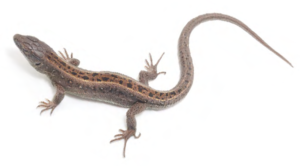 When we purchased our home about 3 years ago, there were small lizards everywhere. And last year they disappeared. How can we encourage the lizards to return? They are great gardening companions. Are our neighbors using too many pesticides? Is that what drove the lizards away?
When we purchased our home about 3 years ago, there were small lizards everywhere. And last year they disappeared. How can we encourage the lizards to return? They are great gardening companions. Are our neighbors using too many pesticides? Is that what drove the lizards away?
Although we don’t have just one answer, we do have several possible answers. If any of these seem like a possible reason, you may be able to make the change that brings these lovely lizards back. If neighbors are using pesticides, the lizards may have left or starved because they don’t have any insects to eat.
Further, there are some commonly used pesticides that can hurt lizards. Imidacloprid and pyrethroids are a problem for the water supply and lizards. Habitat destruction is something to consider. Nearby construction or disturbance of their winter sites of leaves, rocks, or wood piles can be a cause. The last possibility is lizard predator populations may have risen. These include cats, dogs, hawks, and snakes.
Red Spider Mites have been a huge problem for my tomatoes for the last couple of years. The difficulty is there does not seem to be any kind of insect or organic spray that will touch them. I have used horticultural oils and garlic, and I’ve tried numerous other ideas, all to no avail.
Before we get into any insecticides, I’ll review some things that keep your tomatoes strong and less likely to get infested. As the mites like to overwinter near your tomatoes, be sure to rotate where you plant. For many reasons, it is critical to rotate tomatoes, and mites is one of those reasons.
Mites thrive in dry, dusty conditions. Use mulch, especially when the plants are tiny. When the plants are large, they shade the ground and keep dust to a minimum. We have been advised over the last several years to plant closer and closer together, but to beat out mites, the plants need a lot of air circulation. Tight clusters of tomato plants are breeding grounds for mites. Yep, we need air and to avoid dry and dusty. Not fair.
Continue using organic fertilizer. Synthetics push too much growth too fast, and mites LOVE tender, young growth. However, if you have done all these things and your plants are still being bullied, let’s talk pesticides. Neem oil, horticultural oil, or insecticidal soap should work, but mites breed every week. Therefore, you need to apply every week. These mites are obnoxiously small, and complete coverage is required, including undersides and nooks and crannies. Mites are excellent at hide and seek.
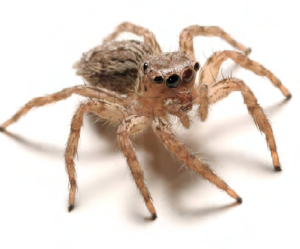 What are your recommendations on best practices to control pests, including lots of spiders?
What are your recommendations on best practices to control pests, including lots of spiders?
There are two ways to answer this, one is for inside the home and one is for outside. Let’s start with outside. Generally, there are spiders this time of year because there is so much for them to eat, as the insects are out in force. The number of insects will start to come down as the seasons change, and then the number of spiders will also go down. At that point, sweep or hose away those old dusty webs, and things should look good again.
Spiders inside the home are unpleasant. Here is a link explaining how best to exclude spiders from inside the home.
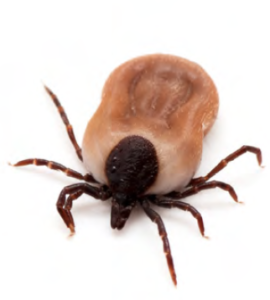 What is the best product to kill ticks in the yard?
What is the best product to kill ticks in the yard?
After a careful review of available literature, no pesticide is okay to spray on the whole yard without harm to you, pets, children, water, or beneficial insects. What can be done? Excluding ticks is the best answer.
In California, about half of the reported cases are contracted around the home in semirural environments. Clearing leaf litter or creating woodchip barriers between lawns and adjacent woodlands, may prove useful in California’s semirural residential settings, or in private or public gardens adjoining natural areas inhabited by wildlife. See this link for appropriate management practices.
If you choose to find a pest control operator, read the section below for guidance.
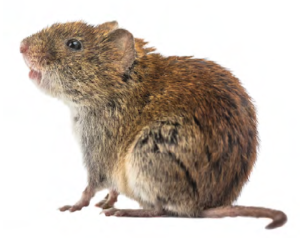 Please rank the different methods of controlling voles, with least harmful numerically first and most harmful numerically last.
Please rank the different methods of controlling voles, with least harmful numerically first and most harmful numerically last.
Voles are vegetarians, and love to eat just about anything. Their shallow tunnels can ruin the look and health of lawns and gardens, leading to desperate plans for revenge. To control voles, there are several methods, but the best is the one that works without harming you, your pets, or the local waterways. For each of the options, see this link for more detailed information on identification and effective control.
- Exclusion is the absolute best option. Use barriers like hardware cloth in planter beds and in-ground wire baskets for new plants in the ground. These metal barriers last longer than other materials and are very hard to chew through. Short barriers around tree trunks prevent chewing damage.
- Habitat modification combined with exclusion is going to be your best bet. Weeds, heavy leaf litter, and dense vegetative cover are protection for voles from predators. Mow and keep down these vole hiding spots.
- Traps work, and they are non-toxic because no bait is needed. However, more than one trap is required, so it can be costly, and they aren’t easy to place.
- Gas bombs, fumigants and flooding tunnels with water doesn’t work on voles (or gophers, moles, or ground squirrels). Their tunnel systems are extensive, and voles just move to another tunnel to ruin another area.
- Baits are not a good choice. Voles won’t eat them because the baits don’t look like their food. The poisons in baitsare easily consumed by other animals we don’t mean to harm, like our pets.
White flies have invaded my vegetable garden. What products do you recommend to eliminate them?
White flies are very common now with warm weather, high moisture in the air, and lots of fresh new growth. Two strategies used together provide control without hurting your plants, beneficial insects, or the water supply, and they keep your veggies safe for you to eat.
First is housekeeping and general care:
- Pluck off the worst leaves. If the plant is seriously damaged, you might need to remove it.
- Let the soil dry out an inch down below the top before you water again. White flies thrive on moisture.
- Stick to organic fertilizers. The slower release formula of organic fertilizers gives fabulous plants without excessive, over-the-top growth that encourages insects and disease.
- Spray the plants off with a hose to remove the majority of the white flies.
Second is pesticide:
Choose horticultural oil, Neem oil, or insecticidal soap. These are effective on soft bodied insects and act short-term, without a waiting period to eat your veggies. Here is a link for further information.

